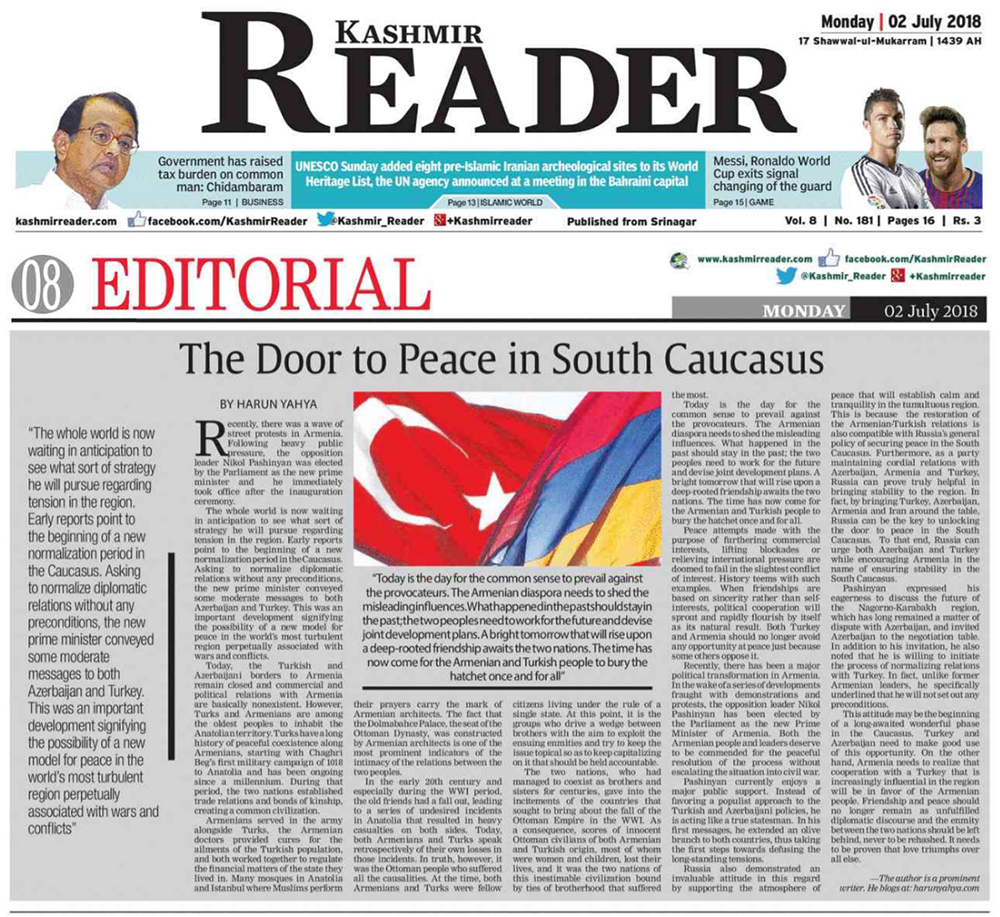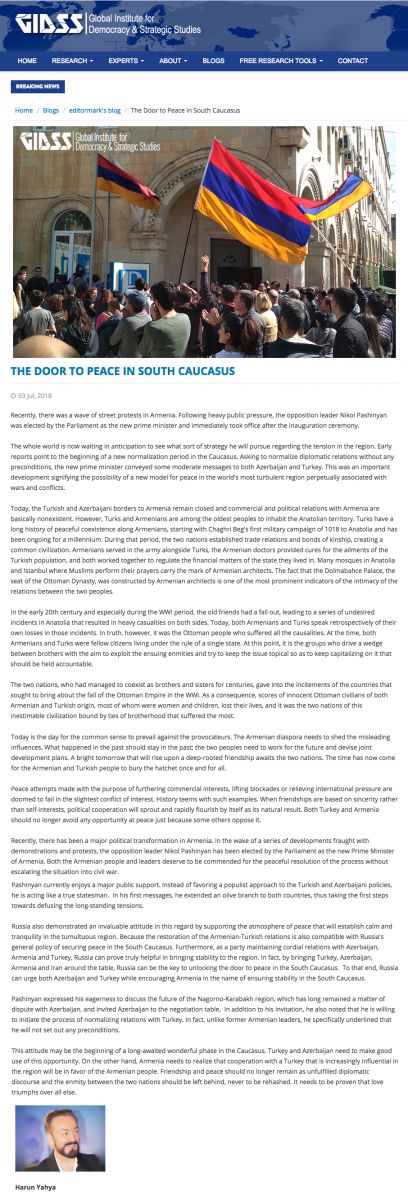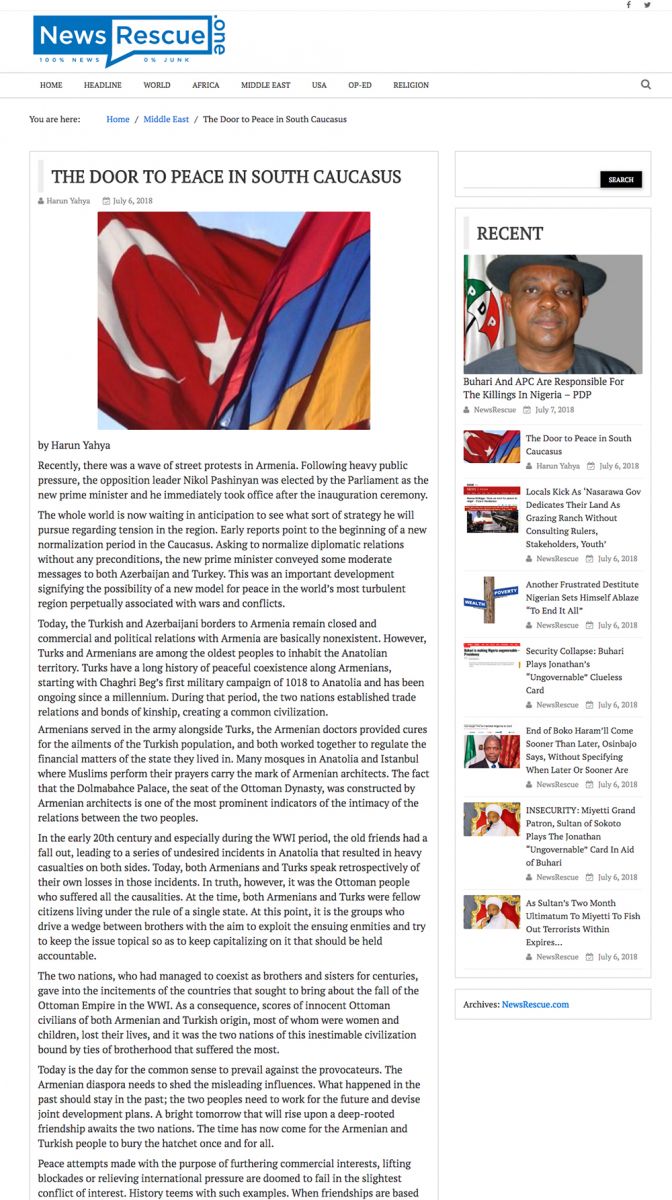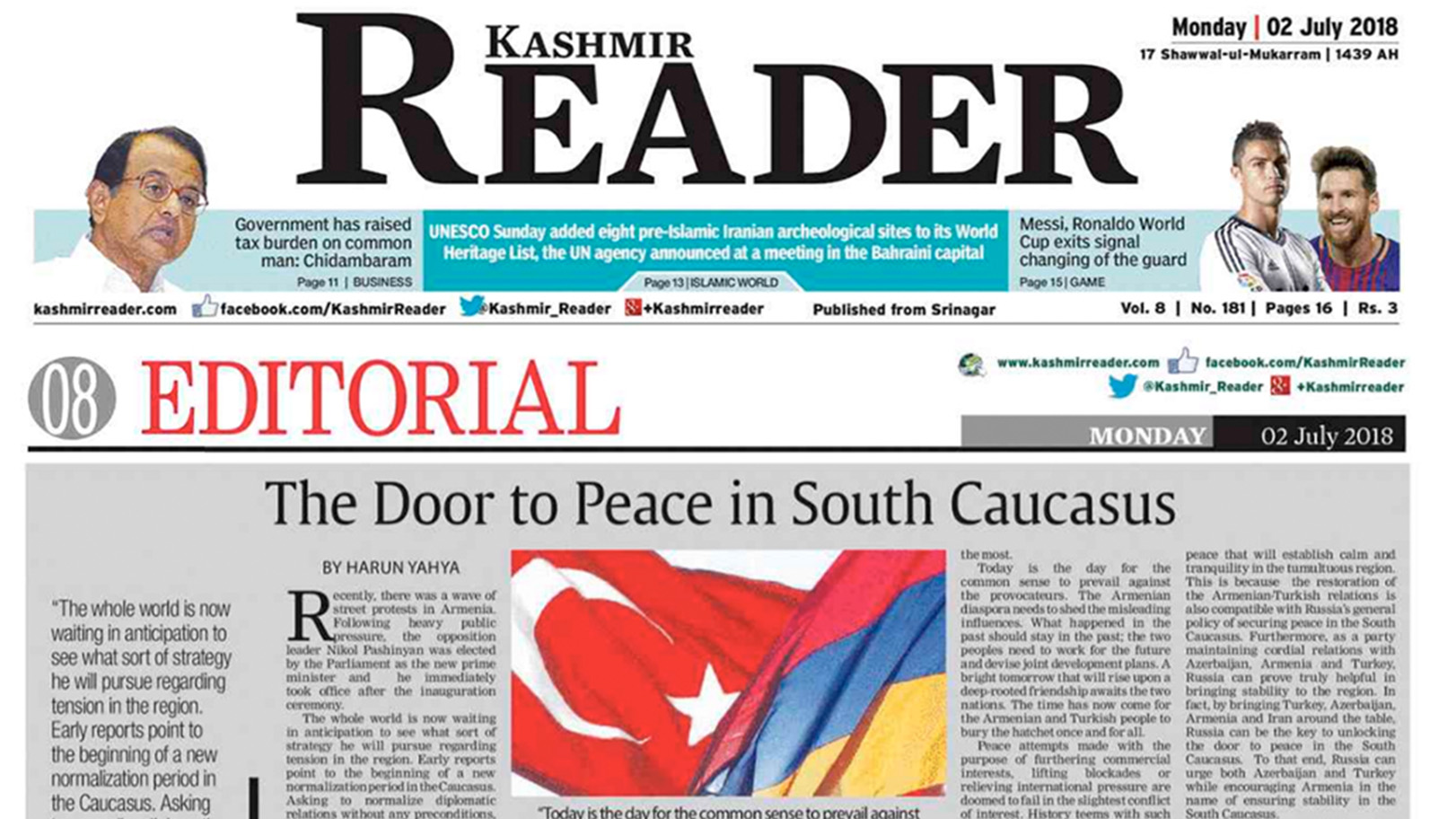
Recently, there was a wave of street protests in Armenia. Following heavy public pressure, the opposition leader Nikol Pashinyan was elected by the Parliament as the new prime minister and he immediately took office after the inauguration ceremony.
The whole world is now waiting in anticipation to see what sort of strategy he will pursue regarding tension in the region. Early reports point to the beginning of a new normalization period in the Caucasus. Asking to normalize diplomatic relations without any preconditions, the new prime minister conveyed some moderate messages to both Azerbaijan and Turkey. This was an important development signifying the possibility of a new model for peace in the world’s most turbulent region perpetually associated with wars and conflicts.
Today, the Turkish and Azerbaijani borders to Armenia remain closed and commercial and political relations with Armenia are basically nonexistent. However, Turks and Armenians are among the oldest peoples to inhabit the Anatolian territory. Turks have a long history of peaceful coexistence along Armenians, starting with Chaghri Beg’s first military campaign of 1018 to Anatolia and has been ongoing since a millennium. During that period, the two nations established trade relations and bonds of kinship, creating a common civilization.
Armenians served in the army alongside Turks, the Armenian doctors provided cures for the ailments of the Turkish population, and both worked together to regulate the financial matters of the state they lived in. Many mosques in Anatolia and Istanbul where Muslims perform their prayers carry the mark of Armenian architects. The fact that the Dolmabahce Palace, the seat of the Ottoman Dynasty, was constructed by Armenian architects is one of the most prominent indicators of the intimacy of the relations between the two peoples.
In the early 20th century and especially during the WWI period, the old friends had a fall out, leading to a series of undesired incidents in Anatolia that resulted in heavy casualties on both sides. Today, both Armenians and Turks speak retrospectively of their own losses in those incidents. In truth, however, it was the Ottoman people who suffered all the causalities. At the time, both Armenians and Turks were fellow citizens living under the rule of a single state. At this point, it is the groups who drive a wedge between brothers with the aim to exploit the ensuing enmities and try to keep the issue topical so as to keep capitalizing on it that should be held accountable.
The two nations, who had managed to coexist as brothers and sisters for centuries, gave into the incitements of the countries that sought to bring about the fall of the Ottoman Empire in the WWI. As a consequence, scores of innocent Ottoman civilians of both Armenian and Turkish origin, most of whom were women and children, lost their lives, and it was the two nations of this inestimable civilization bound by ties of brotherhood that suffered the most.
Today is the day for the common sense to prevail against the provocateurs. The Armenian diaspora needs to shed the misleading influences. What happened in the past should stay in the past; the two peoples need to work for the future and devise joint development plans. A bright tomorrow that will rise upon a deep-rooted friendship awaits the two nations. The time has now come for the Armenian and Turkish people to bury the hatchet once and for all.
Peace attempts made with the purpose of furthering commercial interests, lifting blockades or relieving international pressure are doomed to fail in the slightest conflict of interest. History teems with such examples. When friendships are based on sincerity rather than self-interests, political cooperation will sprout and rapidly flourish by itself as its natural result. Both Turkey and Armenia should no longer avoid any opportunity at peace just because some others oppose it.
Recently, there has been a major political transformation in Armenia. In the wake of a series of developments fraught with demonstrations and protests, the opposition leader Nikol Pashinyan has been elected by the Parliament as the new Prime Minister of Armenia. Both the Armenian people and leaders deserve to be commended for the peaceful resolution of the process without escalating the situation into civil war.
Pashinyan currently enjoys a major public support. Instead of favoring a populist approach to the Turkish and Azerbaijani policies, he is acting like a true statesman. In his first messages, he extended an olive branch to both countries, thus taking the first steps towards defusing the long-standing tensions.
Russia also demonstrated an invaluable attitude in this regard by supporting the atmosphere of peace that will establish calm and tranquility in the tumultuous region. This is because the restoration of the Armenian-Turkish relations is also compatible with Russia’s general policy of securing peace in the South Caucasus. Furthermore, as a party maintaining cordial relations with Azerbaijan, Armenia and Turkey, Russia can prove truly helpful in bringing stability to the region. In fact, by bringing Turkey, Azerbaijan, Armenia and Iran around the table, Russia can be the key to unlocking the door to peace in the South Caucasus. To that end, Russia can urge both Azerbaijan and Turkey while encouraging Armenia in the name of ensuring stability in the South Caucasus.
Pashinyan expressed his eagerness to discuss the future of the Nagorno-Karabakh region, which has long remained a matter of dispute with Azerbaijan, and invited Azerbaijan to the negotiation table. In addition to his invitation, he also noted that he is willing to initiate the process of normalizing relations with Turkey. In fact, unlike former Armenian leaders, he specifically underlined that he will not set out any preconditions.
This attitude may be the beginning of a long-awaited wonderful phase in the Caucasus. Turkey and Azerbaijan need to make good use of this opportunity. On the other hand, Armenia needs to realize that cooperation with a Turkey that is increasingly influential in the region will be in favor of the Armenian people. Friendship and peace should no longer remain as unfulfilled diplomatic discourse and the enmity between the two nations should be left behind, never to be rehashed. It needs to be proven that love triumphs over all else.
Adnan Oktar's piece in Kashmir Reader (India) & GIDSS (USA) & News Rescue (USA):
https://kashmirreader.com/2018/07/02/the-door-to-peace-in-south-caucasus/
http://gidss.com/content/door-peace-south-caucasus
https://newsrescue.one/the-door-to-peace-in-south-caucasus/




